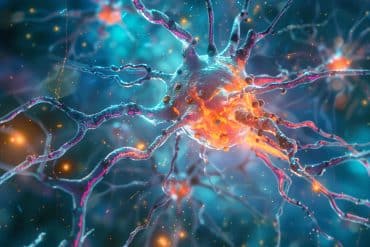Summary: For those with a genetic predisposition for alcohol use disorder (AUD), being in a romantic relationship appears to reduce the high risk to succumbing to alcohol abuse. This protective effect is limited to males only, suggesting males with a genetic risk for AUD may benefit more from romantic relationships.
Source: Virginia Commonealth University
People with a genetic predisposition to risky alcohol behavior are less likely to drink frequently, become intoxicated often, or suffer from alcohol dependence symptoms if they are in a romantic relationship, according to a new study led by a Virginia Commonwealth University researcher.
“We found that the effect of genetic risk for alcohol use was weaker among those who were currently in a relationship,” said lead author Peter Barr, Ph.D., a post-doctoral researcher in the Department of Psychology in the College of Humanities and Sciences.
However, romantic relationships’ “protective effect” against becoming intoxicated frequently was limited to men, bolstering previous research findings that men in romantic partnerships tend to experience greater health benefits than women. The study found no differences between men and women when it came to drinking frequency or alcohol dependence symptoms.
The study, “Polygenic Risk for Alcohol Misuse is Moderated by Romantic Partnerships,” will be published in a forthcoming issue of the journal Addiction. It was based on a sample of 1,201 twins born between 1983 and 1987 identified through Finland’s central population registry.
The study does not suggest causality between romantic relationships and reduced risk for problem drinking, but it did observe that relationships reduce the risk of the realization of underlying genetic predisposition to drinking.
“The big takeaway here is that [a] genetic predisposition [to alcohol consumption] was stronger in people not in a relationship compared to people in a relationship for all those different levels of severity in drinking — from how often you drink, how often you drink to intoxication, and problem drinking [or] alcohol dependence symptoms,” Barr said.
The study’s conclusions reinforce previous findings in sociological and epidemiological research that marriage and intimate partnerships have a positive influence on health and against risky behavior.
“There’s a consistent finding that people in a relationship — typically they look at marriage, but these people were too young for that — have better health and engage in fewer risky behaviors, on average, compared to people who are single or not in a relationship,” Barr said.
Relationships, he said, often result in “increased social control,” meaning the partners monitor one another’s behavior. “There’s someone around who might say: ‘Oh, you’re drinking too much,’” he said. “’Maybe you should cut back on that.’”
Another explanation might be that relationships generally involve certain expectations. “Such as: To be a good father, husband or boyfriend, maybe going out and drinking to the point of intoxication is not congruent with those expectations,” he said.

From a research perspective, Barr said, the study’s findings show the need to include external factors — such as a person’s relationship status or education level — when researchers seek to understand the interplay of genetics and health.
It also has implications for personalized medicine, in which an individual’s genetic data is used to better tailor prevention and intervention in health care.
“Things like genetic risks can’t be understood independent of social context,” he said. “So in our push towards precision medicine, we need to think not just about your own personal predisposition, but your own personal predisposition embedded in different levels of context.”
In addition to Barr, the study’s authors include Sally I-Chun Kuo, Ph.D., Fazil Aliev, Ph.D., Jessica E. Salvatore, Ph.D., and Danielle M. Dick, Ph.D., of VCU’s Department of Psychology; Antti Latvala, Ph.D., and Jaakko Kaprio, M.D., Ph.D., of the Institute for Molecular Medicine Finland at the University of Helsinki; and Richard Viken, Ph.D., and Richard J. Rose, Ph.D., of the Department of Psychological and Brain Sciences at Indiana University.
Source:
Virginia Commonealth University
Media Contacts:
Brian McNeill – Virginia Commonealth University
Image Source:
The image is in the public domain.
Original Research: Closed access
“Polygenic Risk for Alcohol Misuse is Moderated by Romantic Partnerships”. Peter B. Barr, Sally I‐Chun Kuo, Fazil Aliev, Antti Latvala, Richard Viken, Richard J. Rose, Jaakko Kaprio, Jessica E. Salvatore, Danielle M. Dick.
Addiction. doi:10.1111/add.14712
Abstract
Polygenic Risk for Alcohol Misuse is Moderated by Romantic Partnerships
Background and Aims
Previous twin research suggests relationship status can moderate underlying genetic liability towards alcohol misuse. This paper examined: 1) whether genome‐wide polygenic scores (GPS) for alcohol consumption are associated with alcohol misuse; 2) whether these GPS are moderated by romantic relationships (gene‐environment interaction; GxE), and 3) whether GxE results are consistent across sex.
Design
Linear mixed‐effects models were used to test associations between genome‐wide polygenic scores, relationship status, and alcohol use/misuse.
Setting
Finnish twins born between 1983‐1987 identified through Finland’s central population registry.
Participants
An intensively studied subset of Finnish Twin Study (FinnTwin12), during the young adult phase (ages 20‐26). The analytic sample includes those with a complete interview and genetic data (N=1,201, 54% female).
Measurements
Key measurements included involvement in a romantic partnership, drinking frequency, intoxication frequency, and DSM‐IV alcohol dependence (AD) symptoms. Genome‐wide polygenic scores (GPS) were created from available summary statistics from a large genome‐wide association study (GWAS) of drinks per week.
Results
GPS predicted drinking frequency (b = 0.109; 95% CI = 0.050, 0.168), intoxication frequency (b = 0.111; 95% CI = 0.054, 0.168), and AD symptoms (b = 0.123; 95% CI = 0.064, 0.182). Having a romantic relationship negatively influenced the association between GPS and drinking frequency (b = ‐0.105; 95% CI = ‐0.211, ‐0.001), intoxication frequency (b = ‐0.118; 95% CI = ‐0.220, ‐0.016), and AD symptoms (b = ‐0.119; 95% CI = ‐0.229, ‐0.009). There was a 3‐way interaction between sex, relationship status, and GPS for intoxication frequency (b = 0.223; 95% CI = 0.013, 0.433) such that the reduced association between GPS and intoxication frequency for those in a relationship was only apparent in males. We found no evidence of 3‐way interactions for drinking frequency or AD symptoms.
Conclusions and Relevance
Being in a romantic relationship reduced the association between genetic predisposition and drinking, high-risk drinking, and alcohol problems. However, for high-risk drinking the protective effect was limited to males, mapping onto earlier findings suggesting that males benefit more from romantic partnerships.






